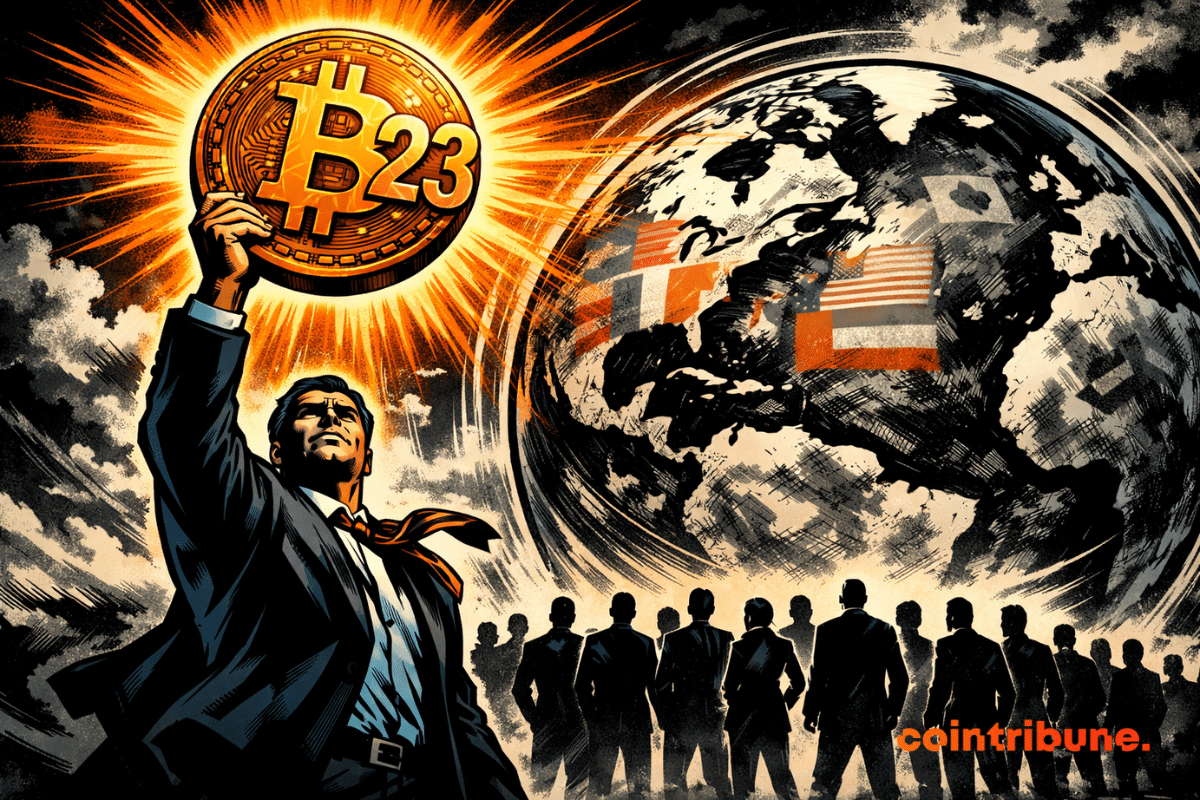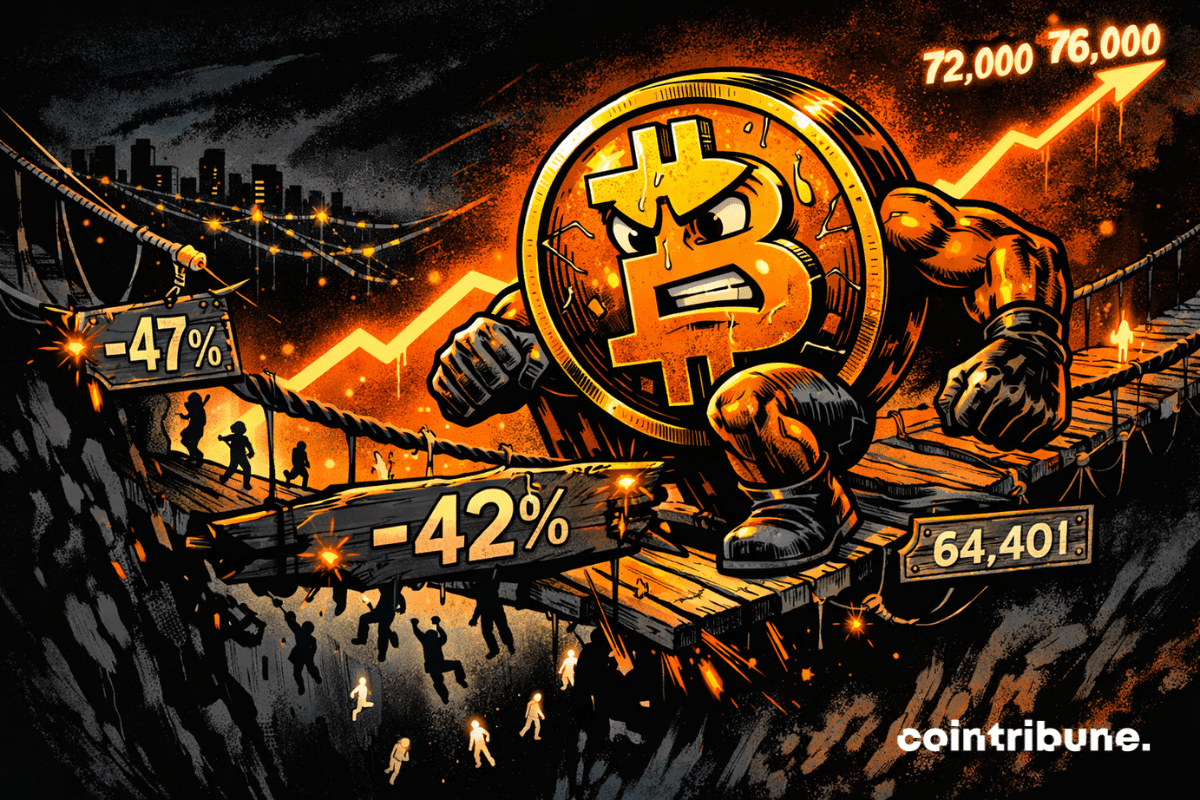Missiles whistle over Tehran, bitcoin plunges in Seoul. 450 million goes up in smoke. Traders cry. The generals, however, count the dead.
Theme Bitcoin (BTC)
Ether is going through a lean period. After a plunge of more than 31% in one month, the second largest crypto in the world seems doomed to stall. And according to a leading analyst, this lull could last.
The four-year Bitcoin cycle has not disappeared into the noise. According to an analysis shared around CryptoQuant data, the 2026 drop resembles, in its internal mechanics, the corrective phase of the previous cycle. Price and on-chain indicators reconnect, like two pieces of the same puzzle once thought lost.
MARA holds 53,822 BTC on the balance sheet, but bitcoin drives Q4 loss explosion. We give you all the details in this article.
Despite the price drop, bitcoin continues to attract online searches. Novices seek to understand, while experienced investors show signs of panic, perhaps signaling a future bullish cycle in the crypto market.
Bitcoin has not confirmed its rebound. After an attempt to recover above $70,000, the price was rejected below the $68,000 trendline, a technical level monitored by analysts. This movement rekindles questions about the end of the bear market, while some signals indicated stabilization. The rejection now places BTC against a major resistance and reignites the debate over the strength of the current cycle.
Bitcoin is increasingly moving from private portfolios to public balance sheets. A new report from River indicates that governments are no longer passive observers of the market. Today, 23 countries hold BTC in some capacity, marking a meaningful expansion of state-level participation.
European investors now have a new way to access Bitcoin-backed corporate yield. 21Shares has launched an exchange-traded product (ETP) tied to preferred shares issued by Strategy, the company led by Michael Saylor and widely recognized as the largest public holder of Bitcoin.
$10.5 billion is the amount of Bitcoin options expiring this Friday, a deadline capable of causing a real short-term shift. After several weeks of bearish pressure, the market faces a decisive test: a simple technical episode or the inflection point awaited by investors? Behind this massive expiry is a precise power struggle between buyers and sellers, the outcome of which could redefine the immediate trajectory of BTC.
Boosted by the rebound in U.S. equity markets and strong corporate earnings, Bitcoin has once again crossed the $69,500 mark, reconnecting with technical levels closely monitored by investors. After several weeks of hesitation, the return of risk appetite reinvigorates the crypto market. It remains to be seen whether this movement marks a true turning point or a mere rebound fueled by the macroeconomic context.
Every morning at 10 AM, bitcoin was sinking. Suspicions about Jane Street, trading giant. A lawsuit arrives, the dump stops. Coincidence? Traders cry victory.
Bitcoin regains momentum at the very moment its traditional benchmarks falter. Rising about 3% to approach $66,000, the crypto moves counter to a correlation with gold and stocks that has fallen to historically low levels. This unexpected decoupling draws analysts' attention, who see it as a potentially decisive signal. Is it just a technical rebound or the beginnings of a larger movement? The market wonders.
ETFs revive bitcoin with $258M inflows. Are institutional investors preparing the next move? Analysis.
Bitcoin shows bold strength in adoption. Institutions, banks, states, merchants, everyone is getting into BTC. Yet, its price remains 50% below its all-time high. A troubling dichotomy that raises an essential question: is the market underestimating what is really happening?
A solo miner used rented on-demand hashrate to mine a rare Bitcoin block, earning 3.125 BTC worth around $200,000.
Bitcoin wavers at a pivotal moment. As Wall Street opens lower and gold falls, the leading crypto dangerously slides towards $60,000, under the combined pressure of traditional markets and a major technical signal. The loss of a long-term support revives bearish scenarios, with some traders already mentioning a return to $45,000. Between chart fragility and macroeconomic nervousness, BTC enters a turbulent zone that could redefine the trajectory for the coming weeks.
Behind the apparent price stability, several key on-chain signals attract analysts' attention and suggest a possible turning point in market dynamics. These indicators, based on actual capital flows and holder behavior, provide clear insight into the balance between bitcoin supply and demand. Is an adjustment phase underway before a return of buyers?
Bitcoin records a historic decline in active addresses. Simple pause or major warning sign for crypto investors?
With every advance in quantum computing, one question repeatedly arises: can bitcoin withstand a machine capable of breaking its cryptographic foundations? The topic, long confined to academic circles, is now imposed in the strategic debate. This week, Michael Saylor took a position, estimating that the threat would not materialize for more than ten years. He even mentions a coordinated global response if the risk became real. Enough to revive the debate on the strength of the protocol.
Bitcoin approaches the end of February under pressure, with market sentiment reaching historically low levels. Sellers take control, whales become active, and comparisons with the 2022 bear market multiply. Should we really expect a return to $50,000?
Bitdeer Technologies has fully liquidated its corporate bitcoin holdings, reporting zero BTC on its balance sheet as of Feb. 20. A weekly production update posted on X confirmed the move. The decision marks a sharp break from common industry practice, where most listed miners continue to accumulate or hold reserves. It also comes at a time of tightening mining margins and the company's recent capital raises.
Bitcoin’s underlying supply dynamics are showing early signs of recovery after months of steady distribution. A key on-chain measure known as apparent demand has returned to positive territory for the first time in three months. The shift comes even as price action remains range-bound and institutional flows stay cautious.
Metaplanet CEO Simon Gerovich has pushed back against growing criticism of the company’s Bitcoin treasury strategy and disclosure practices. Anonymous accounts on X alleged that the firm withheld price-sensitive information tied to large Bitcoin purchases, derivatives positions, and Bitcoin-backed borrowings. Gerovich dismissed the claims, arguing that the company’s filings and public announcements clearly document its activities.
Bitcoin is going through a turbulent zone, but the numbers might tell a very different story. Economist Timothy Peterson just published an analysis that catches attention: according to him, the probability that bitcoin will end the year higher than its current level is 88%. Enough to rekindle hope or fuel debate.
In a crypto market shaken by volatility, Michael Saylor reignites the strategic tension around bitcoin. The head of Strategy hinted that a new purchase might be imminent as his company nears a historic threshold of 750,000 BTC in reserve. This methodical accumulation, carried out despite a bearish context, goes beyond simple treasury management. It could impact market balance and revive the debate on the growing influence of institutional players in the Bitcoin ecosystem.
The crypto market shakes, but investors act. Despite an "Extreme Fear" index and record Bitcoin ETF withdrawals, Robinhood reveals a surprise trend: diversification is exploding. Bitcoin and Ethereum are no longer enough. Which cryptos and strategies dominate the market?
An AI project victim of a token rug pull scam. Result: the word "bitcoin" becomes taboo on its Discord. Crypto, please don't talk about it.
A historical indicator puts bitcoin under pressure. According to a metric based on past cycles, BTC could aim for $122,000 on average over ten months, with a high probability of showing a higher price by 2027. At a time when the market is hesitating between consolidation and bullish recovery, this statistical signal draws attention. It promises nothing, but it revives a central question: is the next peak already forming?
Bitcoin’s short-term risk metrics have slipped into extreme territory, reviving debate over whether the market is nearing another major bottom. A widely followed measure, the short-term Sharpe Ratio, has dropped to around -38.38—a level seen only a handful of times in Bitcoin’s history. Analysts tracking on-chain and statistical data say similar readings have previously aligned with long-term buying opportunities.
The big fish are emptying their pockets on Binance. The whale ratio soars to 0.64. Meanwhile, small holders watch their altcoins sink. Nice!





























